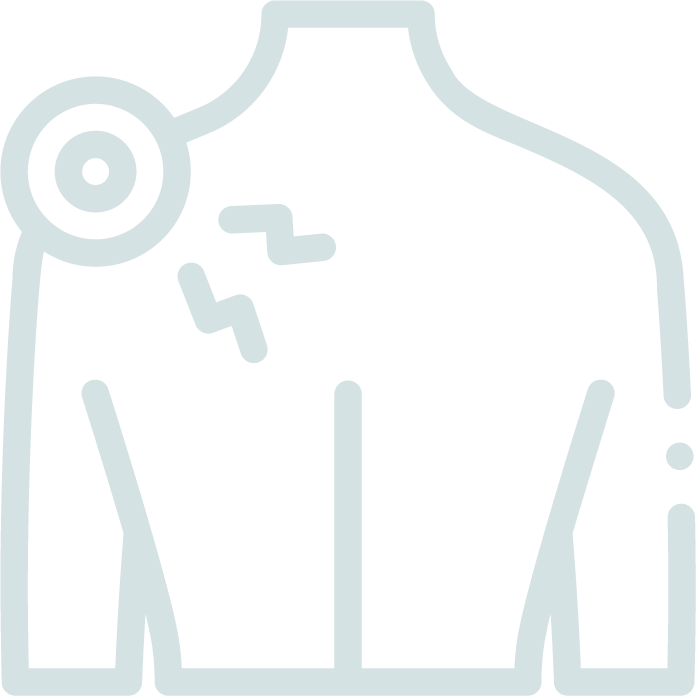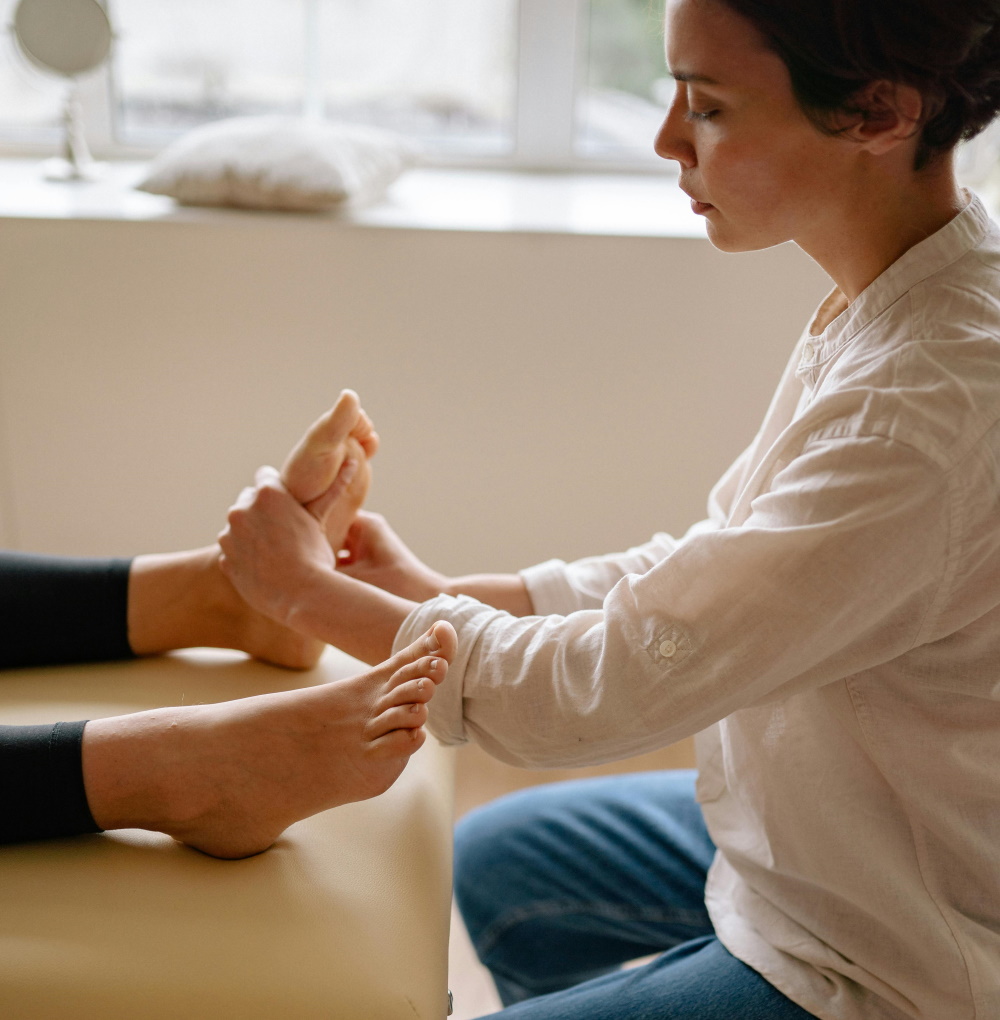Massage
Massage has been used for centuries as a way of aiding relaxation, helping with sleep, as well as relieving anxiety and stress. It is usually a safe therapy for all age groups.
Our massage therapist Helen Storey uses a wide variety of massage techniques designed to address your specific needs. For example someone needing a relaxing massage to decrease stress levels will need a very different approach to someone needing training support for the Great North Run.
We will tailor a treatment to your needs. Read more about our various massage types below.
Massage for relaxation
This helps to promote deep relaxation and a sense of calm and relieves anxiety and stress.
Massage signals the brain to release ‘endorphins’ – the chemicals which give us the feelings of wellbeing and are also our natural painkillers. It reduces the amount of stress hormones we make – high levels of which tend to impair the immune system.
Lymphatic drainage strokes and techniques are particularly helpful for releasing tension.
Therapeutic/remedial massage
This style of massage involves working with tissues on a variety of levels and is often used after injury or strain, but can also be used on a regular basis to “maintain” wellbeing.
Remedial massage may reduce stress induced muscle tensions. During treatment we may work on specific ‘trigger points’ where an area of contracted muscle refers pain to a distant area.
This style of massage is an excellent way of helping to ease musculoskeletal problems.
Deep tissue massage
This type of massage may benefit people participating in sports and regular exercise and those working in demanding physical jobs.
Treatments vary from back and shoulder work, to deep tissue and muscle work of the legs for runners or people playing sport regularly.
This massage may aid the body’s own natural lymph circulation which eliminates toxins and transports nutrients to the cells.

Back, neck & shoulder massage
Various levels of pain and sometimes loss of mobility can be caused by problems arising from the head, neck and shoulder areas. Problems may be caused by stress, injury, posture and other lifestyle factors.
Many of our pains and strains are caused by routine activities such as desk and computer based work, repetitive strains from driving, or even awkward sleeping positions.
As a lot of tension is carried in the neck, shoulders and chest, this massage focuses on opening up the chest, relaxing the shoulders and relieving tensions in the back. This treatment combines a number of stretching and passive movements, guiding the joints gently.
Massage during pregnancy
The back frequently needs additional support during pregnancy, due to weight gain, hormonal changes and the slackening of ligaments around the pelvis and lower back.
Massage may be helpful in relieving musculoskeletal problems caused by pregnancy.
Massage in pregnancy may help with relaxation, aiding sleep and promoting a sense of wellbeing.
What should I expect from treatment?
A confidential case history will be taken, you will be asked about your general health and your expectations of the treatment.
Massages usually require you to remove clothing from the area being treated but this is done with discretion, keeping you warm and comfortable.
After treatment you may like a glass of water before going about your daily business – it is recommended that you try to take things easier for a few hours.
Everyone is unique and all therapies are tailored to your individual needs.
You are welcome to have a friend or relative with you during the session if you wish. If you are under 18 we do require a parent/guardian to be with you.
Indian head massage
Indian head massage has been used for thousands of years and is now very popular as a westernised treatment.
What does it involve?
Indian head massage uses different techniques and movements including stroking, kneading and gentle compressions on the tops of the arms, shoulders, neck, head, scalp and face. Muscles are gently stretched and relaxed to promote a feeling of relaxation and wellbeing.
- It may help release stress accumulating in the tissues, muscles and joints of the head, neck and shoulders.
- It may help minimize tension in the neck and head.
- It may help with blocked sinuses and the remnants of cold symptoms.
- It may help joint flexibility and mobility of the neck and shoulders.
- The final part of the treatment includes strokes and smooth movements around the pressure points of the face.
A shortened Indian head massage can be tailored to help relieve a stressed and cluttered mind and is especially beneficial for people working at a desk or within an office for long periods of time. It is a calming and a relaxing therapy after which you may find it easier to concentrate.
Indian head massages are done fully clothed, with you sat comfortably in a chair. It is usually done without oils.
Reflexology
Reflexology has been around for more than 5,000 years in China and Egypt. Introduced to the UK in the 1960s we have westernised and developed it to form a relaxing, non invasive and enjoyable treatment to help combat the stresses and strains of modern day living. It can usually be received by all ages.
Reflexology uses thumb and finger pressure on different areas of the feet which correspond to different areas of the body – as if the feet are a mirror image of the body.
*Reflexology is not used to cure or diagnose serious illness or disease. Medical attention should always be sought when you are concerned about continuing symptoms.
How does Reflexology work?
In oriental medicine it is believed that our bodies hold an energy force like a magnetic field and when blockages occur we need to open up the pathways to allow the energy to recirculate.
A western theory is that lactic acid builds up causing tiny crystals which disturb energy flow and if they can be recycled energy is allowed to circulate again.
It could also be that when tension and stress cause pain, relaxation helps to ease it and physical touch is one of the most comforting ways to show care and empathy.
- May help to ease stress and relieve anxiety.
- May help with relaxation.
- May improve mood and promote a sense of wellbeing.
- May help to relieve tension and therefore can aid sleep.
What should I expect from treatment?
After a brief medical history is taken the therapy takes place in a comfortable chair or on the therapist’s couch. Reflexology is carried out with a fine powder and is completed with a relaxing foot massage, using cream.
First ever massage yesterday, didn’t know what to expect but Helen was brilliant. I am sitting straighter and feeling relaxed for the first time in a long time. Fully recommend her and will be returning to deal with my pesky left gastrocnemius!


